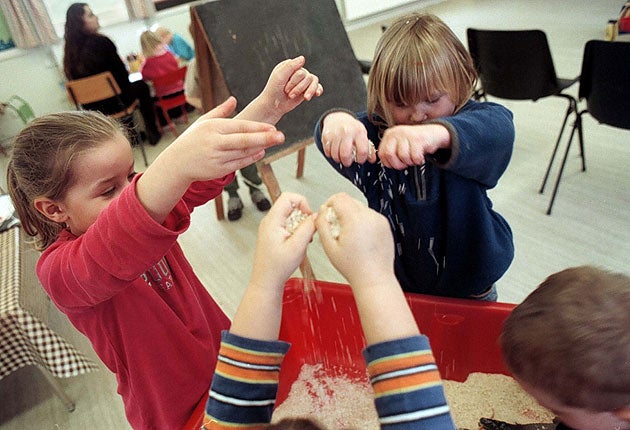Mothers 'should be paid to stay home with their children'

Your support helps us to tell the story
From reproductive rights to climate change to Big Tech, The Independent is on the ground when the story is developing. Whether it's investigating the financials of Elon Musk's pro-Trump PAC or producing our latest documentary, 'The A Word', which shines a light on the American women fighting for reproductive rights, we know how important it is to parse out the facts from the messaging.
At such a critical moment in US history, we need reporters on the ground. Your donation allows us to keep sending journalists to speak to both sides of the story.
The Independent is trusted by Americans across the entire political spectrum. And unlike many other quality news outlets, we choose not to lock Americans out of our reporting and analysis with paywalls. We believe quality journalism should be available to everyone, paid for by those who can afford it.
Your support makes all the difference.Mothers should receive financial help of up to £6,000 a year to stay at home and care for their babies and toddlers, according to a report which says that nurseries fail to provide the one-to-one adult interaction children need.
Too many parents of babies and toddlers are being forced back to work by financial pressure and government policy when they would prefer to stay at home during their offspring's earliest years, according to the research by a think-tank chaired by the former Conservative leader Iain Duncan Smith.
Many of society's problems, such as knife and gun crime among teenagers, alcohol and drug abuse and poor mental health can be traced back to parental neglect when children were very young, said the Centre for Social Justice.
Its recommendation was based on "compelling" research in psychology and neuroscience over the past decade which has suggested that a close bond between parent and child is vital to a child's future health and happiness.
The report, The Next Generation, accused the Government and wider society of ignoring the importance of one-to-one interaction for the under-threes, and of preferring to prioritise paid work over childrearing.
It criticised Labour's Sure Start programme, saying it was set up with the right intentions, but had become patchy and in too many parts of the country had moved from being about support for parents in child-rearing into back-to-work child care.
"We need to level the financial playing field for parents," Mr Duncan Smith said. "The current system pressurises mothers – and it is mostly mothers – into going back to work soon after their children are born.
"Yet the research shows clearly that the seeds of later unhappiness and anti-social behaviour by young people are often sown by the failure of parents to form a close and loving relationship with their babies. Society is paying a high price for the quick fix of getting mothers back to work so soon after birth.
The findings will be considered by David Cameron, the Tory leader, who has tried to put family-friendly policies at the heart of Conservative strategy. It represents a direct challenge to government policy and much accepted thinking and practice about childrearing, which is largely geared towards putting children into nurseries and getting mothers back to work.
However, very young children need intensive nurturing and attention which they simply cannot get in many nurseries and childcare settings, said the report's author, Samantha Callan.
A spokesperson for the Department of Children, Schools and Families said it was "committed to ensuring that every child has the best start in life, and maximising choices and opportunities for parents." He added: "That is why we have invested well over £21bn on transforming childcare services over the last 10 years. We are providing substantial help of £3.5m a day to lower- and middle-income families through the tax credit system, with 450,000 families nationwide currently receiving support."
Join our commenting forum
Join thought-provoking conversations, follow other Independent readers and see their replies
Comments